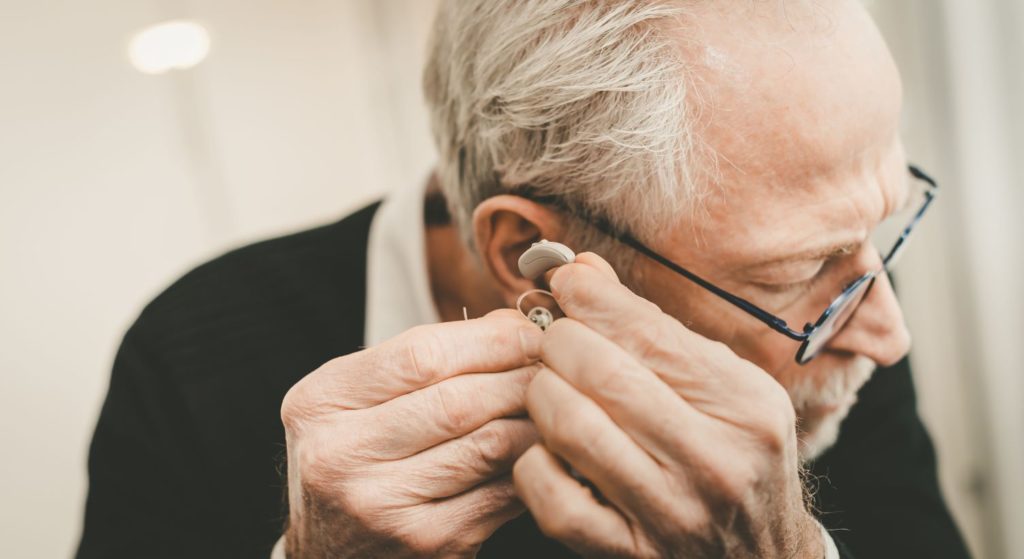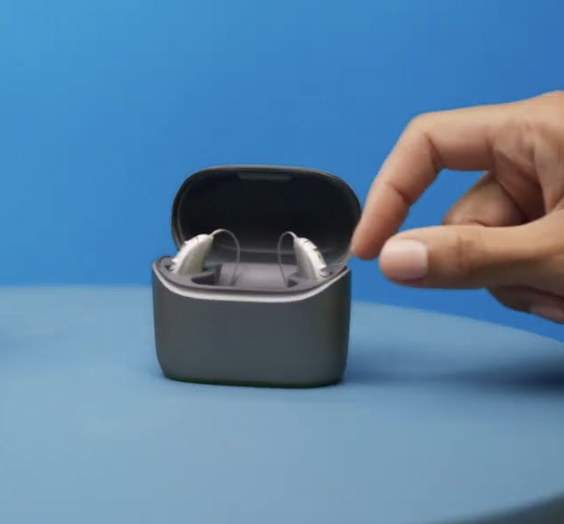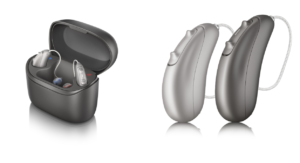
Gradual hearing loss and cognitive decline are common ageing factors, and studies have shown a strong association between dementia and hearing loss. Research suggests that you can decrease the risk of dementia by seeking hearing treatments as soon as hearing loss is noticed in middle age.
Whilst there is no way to completely avoid the decline in our cognitive abilities or the onset of dementia, there are ways we can slow the process down by having a better understanding of the link between our cognitive functions and hearing loss.

How are hearing loss and dementia linked?
Research has established a link between hearing loss and cognitive decline, including an increased risk of developing dementia. A study in The Lancet said there was an urgent need for more people to use hearing aids in their forties, fifties and sixties.
This landmark study looked at 438,000 people in the UK with an average age of 56 and followed them for 12 years. One in four people reported some level of hearing loss as they grew older; this group was 42% more likely to be diagnosed with dementia.
Another study conducted by the University of Exeter and King’s College London found that hearing aid use was associated with a 36% lower risk of developing dementia. The study analysed data from over 25,000 individuals with hearing loss and found that those who used hearing aids had a lower risk of cognitive decline compared to those who did not use hearing aids.
Previous research has also suggested that hearing loss is linked to 8% of dementia cases, making it a more significant factor than smoking or alcohol consumption.
Whilst it’s understood that both conditions can impact each other, there is no solid evidence of why this link occurs. Researchers have shared several theories on why hearing loss may worsen our cognitive decline, and these theories include:
Brain structure
When the brain lacks stimulation, brain cells can shrink. For those with hearing loss, this can apply to the regions of the brain that struggle to receive and process sounds and can cause the cells to shrink over time.
Cognitive load
When hearing loss is left untreated, it can put the brain under unnecessary strain as it continuously struggles to process sounds. This can lead to the brain becoming overworked and not functioning efficiently.
Social isolation
Unmanaged hearing loss can lead to social isolation as the individual can withdraw from situations where they struggle to participate in conversations. Spending too much time in isolation can therefore lead to the brain not receiving enough stimulation.
Recent studies have concluded that hearing loss and dementia can promote an increase in cognitive decline because it leads to a degeneration of the auditory centres in the brain, due to a lack of auditory input. When this happens, the brain begins to compensate and uses more resources to process auditory information.
Can hearing aids prevent dementia?
There is currently an estimated 900,000 people living with dementia in the UK, and this number is expected to rise sharply in the coming years. However, treating hearing loss through hearing aids and cochlear implants could potentially help prevent tens of thousands of dementia cases.
Hearing aid use has been shown to improve cognitive function and slow cognitive decline as they help to maintain connections between brain cells, therefore preventing the negative effects of hearing loss, such as lack of sensory stimulation and reduced social interaction.
Tom Dening, a Professor of dementia research at Nottingham University, says that there is mounting evidence that hearing aids can help to fight dementia. He added:
“There has been a lot of interest in hearing conditions and their possible contribution to the risk of developing dementia in recent years, and it is estimated that hearing may account for about 8% of the potentially modified risk of developing dementia.
As someone who has recently started to use hearing aids, I am greatly encouraged by these findings and, as a clinical researcher, I appreciate having better data on which to base my advice to patients. We need to use studies like this to encourage the public not to be embarrassed by hearing problems and to seek assessment and treatment sooner rather than later.”
It is thought that the use of hearing aids may help reduce the risk of dementia by improving communication and social interaction, which can help maintain cognitive function. Hearing aids may also help reduce cognitive load by improving auditory processing and reducing the need for individuals to devote cognitive resources to hearing and understanding speech.
However, it’s important to note that while hearing aids may be beneficial in reducing the risk of dementia, they are not a guaranteed prevention method. More research is needed to fully understand the link between hearing aids and dementia, but current evidence suggests that the use of hearing aids may have a positive impact on cognitive function in individuals with hearing loss.

Managing hearing loss and cognitive decline
Hearing loss is a widespread and prevalent condition affecting millions of individuals worldwide. It is not only a communication challenge but it can also have broad implications on your overall health and well-being.
Additionally, hearing loss can lead to loneliness and social isolation due to reducing social engagement and communication, as well as depression, which are also risk factors for dementia.
It is believed that mild hearing loss can lead to a doubled risk of dementia, moderate hearing loss can lead to a tripled risk of dementia, and severe hearing loss can lead to a quintupled risk of dementia – that’s five times a greater risk of developing a decline in cognitive function.
Sometimes, individuals with dementia mistakenly attribute their hearing loss symptoms to the condition, causing it to go undiagnosed. This confusion can result in untreated hearing loss, which can worsen over time and aggravate dementia symptoms.
If you observe signs of hearing loss or increased cognitive decline in yourself or a loved one, it is crucial to seek professional help promptly. Caring for your ear health extends beyond participating in conversations. Timely treatment of hearing loss is the most effective way to slow down the progression of cognitive decline, and we are here to assist you.
Dementia and auditory training and speech therapy
In addition to hearing aids, auditory training is another intervention that has been shown to improve speech comprehension and cognitive function in individuals with hearing loss. Auditory training can help individuals improve their ability to process speech and other sounds, potentially reducing the cognitive load associated with hearing loss. It typically involves exercises and tasks designed to improve speech comprehension and sound localisation skills.
Speech therapy can also be beneficial for individuals with hearing loss, particularly those with speech discrimination difficulties. Speech therapy can improve speech recognition and language processing in individuals with hearing loss and typically involves exercises and tasks designed to improve speech recognition and language processing skills.
Conclusion
On average people wait 10 years before addressing issues of hearing loss, which in turn could also indicate possible cognitive decline. Fortunately, regular hearing tests and prompt treatment of hearing loss can help to preserve cognitive function, improve your quality of life and decrease the risk of developing dementia later in life.
Harley Street Hearing is a dementia-friendly hearing clinic, we are the largest independent hearing clinic in London. We treat every patient with care and understanding and pay particular attention to their individual hearing needs.
If you feel like you are experiencing hearing difficulties, act now and get in touch to book an appointment on 020 7486 1053 or complete the form below.
Enjoy this article? You might be interested in some of our others:


 Designed focusing on comfort, aesthetics and ease-of-use, Moxi Vivante features new RIC (Receiver-in-Canal) designs and a new charging case.
Designed focusing on comfort, aesthetics and ease-of-use, Moxi Vivante features new RIC (Receiver-in-Canal) designs and a new charging case.






Recent Comments